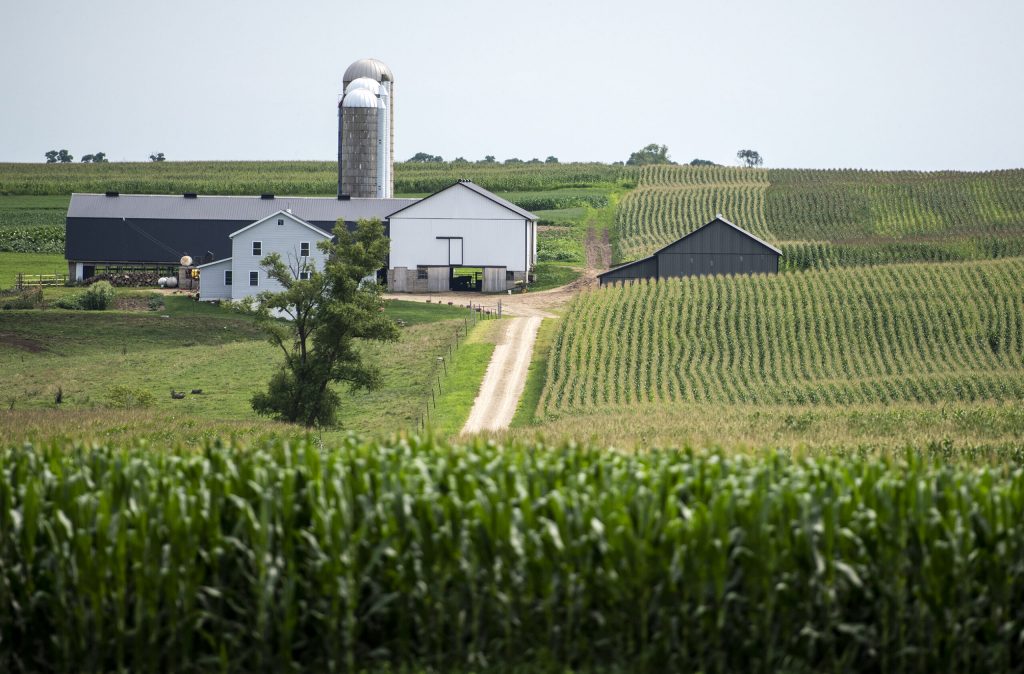Judge Dismisses Business Group’s Lawsuit Over Local Control of Large Farms
Counties and towns have passed ordinances to regulate CAFO operations, while farm groups want to prevent them.
A judge has dismissed a Polk County case that challenged a local ordinance regulating large farms. The order comes as more communities have sought local control over concentrated animal feeding operations or CAFOs.
The legal arm of Wisconsin Manufacturers & Commerce, the state’s largest business group, sued the Town of Eureka on behalf of residents Ben and Jenny Binversie. They wanted to prevent the town from enforcing its CAFO ordinance. The couple claimed the ordinance is unlawful and its provisions preempt the state’s livestock facility siting law and other state regulations.
The town’s ordinance seeks to regulate the operation of CAFOs — not where they’re located. It would apply to new farms with more than 700 animal units or roughly 500 dairy cows. It asks applicants to set aside money for any cleanup or closure related to operations. The ordinance also allows the town to impose conditions on operators like controlling air pollution, monitoring water, preventing diseases, managing waste and submitting plans for dead animals.
In an oral ruling on Jan. 9, Washburn County Judge Angeline Winton said the Binversies lacked standing to bring the challenge because they weren’t directly affected.
“The Binversies acknowledge that they are not subject to the Ordinance nor has anyone else applied for permitting under the Ordinance,” Winton said.
The Binversies had argued they would be harmed as taxpayers, saying the ordinance would result in spending public funds to review any application and enforce it. The town’s ordinance requires fees to apply for a CAFO operation permit and applicants must pay to offset the town’s costs.
Scott Rosenow, executive director of the WMC Litigation Center, said neither he nor the Binversies had any comment on the ruling.
Don Anderson, chair of Eureka’s town board, said he’s pleased with the ruling. “We have faith in our ordinance that it’s protecting the residents of the township,” Anderson said.
Kim Bremmer, executive director of Venture Dairy Cooperative, said she’s disappointed with the judge’s ruling. She hopes that WMC and the Binversies appeal the decision.
“You shouldn’t have to wait for your government to break the law before you’re able to challenge them, and that’s what the judge ruled,” Bremmer said.
While the group wasn’t party to the case, Venture Dairy and Wisconsin Dairy Alliance have sued the Department of Natural Resources over CAFO permitting requirements that they say can’t be enforced. A Calumet County judge ruled against the groups, which appealed the decision. Environmental advocates say the case threatens to roll back state environmental protections. On Thursday, the Wisconsin Supreme Court denied a request from Clean Wisconsin and the Wisconsin Farmers Union to bypass the appeals court.
Regarding Eureka’s ordinance, Bremmer said such regulations would prevent expansion of farms and potentially harm the future of Wisconsin’s $116 billion ag industry. She said many conditions in Eureka’s ordinance would make it “impossible” to farm, including financial assurance requirements that she called unreasonable.
The ruling comes as more communities are passing operations ordinances for CAFOs according to Lisa Doerr, a hay farmer in Polk County.
“Other towns around the state and some counties are looking at it as a possibility, too,” Doerr said.
She said three northern Wisconsin counties and eight towns have passed ordinances to regulate CAFO operations, including one enacted by the Pierce County town of Maiden Rock in December. Bremmer said she would like to see legislation brought back on preempting local animal ordinances.
Bill sought to bar local control of farm operations
Last year, Wisconsin Republican lawmakers introduced a bill that would have preempted certain local animal ordinances. The proposal would’ve barred local governments from enacting regulations for farms or commercial operations, including CAFOs. Gov. Tony Evers vetoed the bill over objections to preventing the ability of local officials “to pass ordinances with the interests of their community in mind.”
Tim Fiocchi, senior government relations director with the Wisconsin Farm Bureau Federation, said in an email that the group is still thinking about plans for this legislative session. But Fiocchi said it’s an issue the group is always monitoring.
“At the end of the day, the more local governments bow to pressure to pass things that make it more difficult or even impossible to farm, the more pressure there will be to do something about it for our members,” Fiocchi said.
Andrew Marshall, an attorney for Eureka, said the case against the town is an example of big business and industrial agriculture taking advantage of small towns.
“They’re opposed to the towns protecting themselves, and ordinances like the Eureka ordinance allow small towns to protect themselves from what can really be devastating pollution,” Marshall said.
Local residents, like Doerr who lives in Laketown, said the DNR doesn’t have enough staff and resources to ensure the state’s more than 300 CAFOs are following regulations or verify that operations have sufficient land or storage to spread the millions of gallons of manure they produce each year.
“Our local communities are the last front against this industry,” Doerr said.
Bremmer countered that CAFOs must meet many regulations from the DNR that are aimed at protecting the environment, adding town boards should work with local farmers to address any issues that don’t fall under state oversight.
Amid battles over local control, judge dismisses challenge over local regulation of large farms was originally published by Wisconsin Public Radio.
If you think stories like this are important, become a member of Urban Milwaukee and help support real, independent journalism. Plus you get some cool added benefits.






















